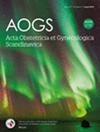Maternal asthma during pregnancy and the likelihood of neurodevelopmental disorders in offspring
Abstract
Introduction
Asthma is the most common chronic disease during pregnancy. Maternal asthma has been associated with a multitude of unwanted pregnancy outcomes, in some studies also with neurodevelopmental disorders. Here we investigated associations between maternal asthma and neurodevelopmental disorders.
Material and Methods
We studied a retrospective population-based cohort of 1 271 439 mother–child pairs from singleton live births in Finland between the years 1996–2018. We used multiple high-cover registers for data collection. Adjusted unconditional Cox regression models were used to investigate associations between maternal asthma, asthma medication used during pregnancy, and offspring's neurodevelopmental disorder diagnoses.
Results
We identified 106 163 mother–child pairs affected by maternal asthma. We found that maternal asthma was associated with offspring neurodevelopmental disorders, but the differences in absolute prevalence between the control and exposure groups were small. Attention-deficit hyperactivity disorder (ADHD) was found in 4114 (3.9%) offspring with maternal asthma and in 32 122 (3.0%) controls (adjusted hazard ratio (HR): 1.49; 95% CI 1.44–1.54); autism in 1617 (1.5%) offspring vs 13 701 (1.3%) controls (HR: 1.33; 95% CI 1.26–1.40); motor-developmental disorder in 1569 (1.5%) offspring vs 12 147 (1.1%) controls (HR: 1.37; 95% CI 1.30–1.45); language disorder in 3057 (2.9%) offspring vs 28 421 (2.7%) controls (HR: 1.13; 95% CI 1.08–1.17), learning disabilities in 849 (0.8%) offspring vs 6534 (0.6%) controls (HR: 1.51; 95% CI 1.41–1.62); mixed developmental disorder in 1633 (1.5%) offspring vs 14 434 (1.3%) controls (HR 1.20; 95% CI, 1.14–1.26); and intellectual disability in 908 (0.9%) vs 9155 (0.9%) controls (HR: 1.12; 95% CI 1.04–1.20). No substantial differences were found between allergic and non-allergic asthma phenotypes, and neither allergic tendency nor respiratory infection was associated with a similar likelihood of neurodevelopmental disorders.
Conclusions
Maternal asthma and allergic and non-allergic phenotypes showed weak associations with the offspring's neurodevelopmental disorders. The association is concerned especially with learning disabilities, ADHD, motor development, and autism.


 求助内容:
求助内容: 应助结果提醒方式:
应助结果提醒方式:


